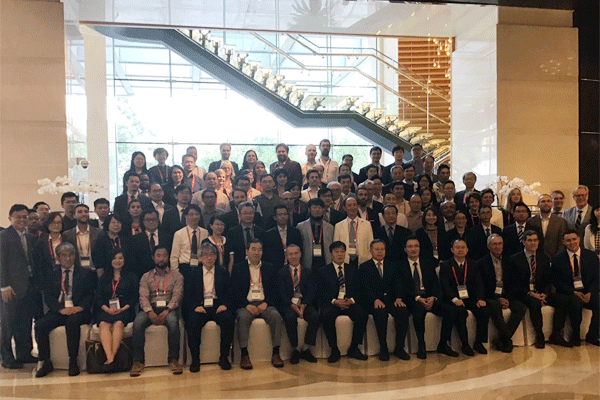News
KLRI Held Joint Workshop with OECD in Shanghai

The Korea Legislation Research Institute (KLRI) held a joint workshop with the OECD on the theme, “Minding Neurotechnology: Delivering responsible innovation for health and well-being,” from September 6 (Thursday) to 7 (Friday) at Tongji University in Shanhai, China.
With about 80 participants, including the members of the EU Directorate-General for Public Health as well as industry insiders, policy makers and social scientists from the US, Canada, the UK, Germany, France, Japan, and other OECD member countries, the workshop was focused on exploring unique ethical, legal, and policy challenges that could be raised in the fields of brain science and neurotechnology, while discussing legislative strategies to address such challenges.
The two-day event consisted of five sessions and the subjects discussed during the sessions were:
▲ Neurotechnology and Artificial Intelligence Science
Before presentations began, Tan Le, CEO of US bioinformatics firm EMOTIV, gave her keynote speech on the theme, “The Digital Era and Brain Health: Providing Neurotechnology for Society.”
Her speech was followed by presentations and discussions by experts in related fields. Among them were: Jun-kil Been, CEO of Neurophet, a neurotechnology startup; Dr. A. Lyric Jorgenson of the US National Institutes of Health (NIH); Dr. Sung-jin Jeong of the Korea Brain Research Institute; Seung-hye Wang, research fellow of the KLRI; Dr. Moon-kyo Chung of the Korea Technology Finance Corporation (KOTEC); and Oh-hyoung Kwon, a partner of Futureplay, an investment firm.
“The ‘Brain project’ aims at understanding the structure and functions of the brain and identifying the causes of brain diseases,” KLRI President Rhee Ik-hyeon said. “To promote problem-solving through new neurotechnology, it is important for the government to establish relevant policies and legal systems so as to create an environment where innovative efforts can continue.”
This year, the KLRI is conducting joint research with the OECD as part of its global legislative research project to address legal and policy issues for neuroscience innovation. Last year, the institute participated in preparing guidelines for the development and responsible use of gene editing technology.
Date: September 6 (Thur.) ~ 7 (Fri.), 2018
- Date 2018-09-06 View 1059
The Korea Legislation Research Institute (KLRI) held a joint workshop with the OECD on the theme, “Minding Neurotechnology: Delivering responsible innovation for health and well-being,” from September 6 (Thursday) to 7 (Friday) at Tongji University in Shanhai, China.
With about 80 participants, including the members of the EU Directorate-General for Public Health as well as industry insiders, policy makers and social scientists from the US, Canada, the UK, Germany, France, Japan, and other OECD member countries, the workshop was focused on exploring unique ethical, legal, and policy challenges that could be raised in the fields of brain science and neurotechnology, while discussing legislative strategies to address such challenges.
The two-day event consisted of five sessions and the subjects discussed during the sessions were:
▲ Neurotechnology and Artificial Intelligence Science
▲ Risk Management and Responsibility by Neurotechnology Developers
▲ Social Expectations and Roles of Public and Private Investors
▲ The Current State of Plans for Research and Development of Brain Science
▲ Legislative Issues on Brain Science Research.
Before presentations began, Tan Le, CEO of US bioinformatics firm EMOTIV, gave her keynote speech on the theme, “The Digital Era and Brain Health: Providing Neurotechnology for Society.”
Her speech was followed by presentations and discussions by experts in related fields. Among them were: Jun-kil Been, CEO of Neurophet, a neurotechnology startup; Dr. A. Lyric Jorgenson of the US National Institutes of Health (NIH); Dr. Sung-jin Jeong of the Korea Brain Research Institute; Seung-hye Wang, research fellow of the KLRI; Dr. Moon-kyo Chung of the Korea Technology Finance Corporation (KOTEC); and Oh-hyoung Kwon, a partner of Futureplay, an investment firm.
“The ‘Brain project’ aims at understanding the structure and functions of the brain and identifying the causes of brain diseases,” KLRI President Rhee Ik-hyeon said. “To promote problem-solving through new neurotechnology, it is important for the government to establish relevant policies and legal systems so as to create an environment where innovative efforts can continue.”
This year, the KLRI is conducting joint research with the OECD as part of its global legislative research project to address legal and policy issues for neuroscience innovation. Last year, the institute participated in preparing guidelines for the development and responsible use of gene editing technology.
Date: September 6 (Thur.) ~ 7 (Fri.), 2018
Venue: Tongji University, Shanghai, China